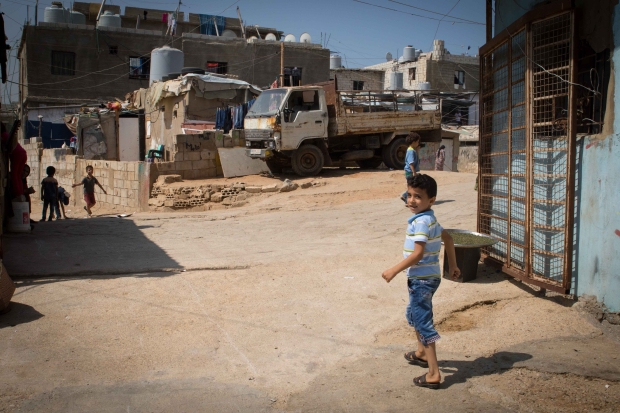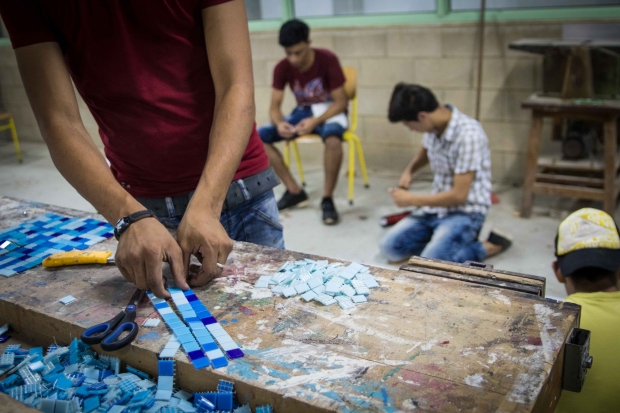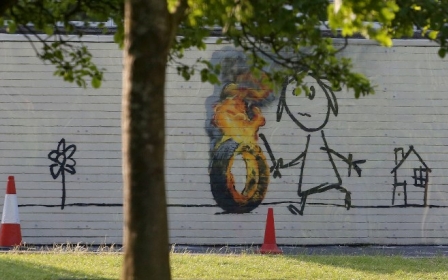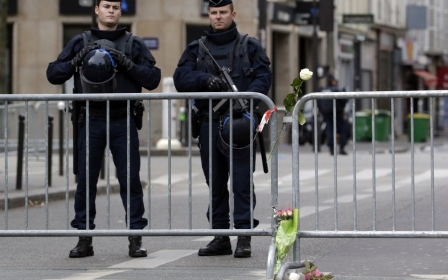Lebanese sisters try new approach: Listening to militants in Roumieh prison
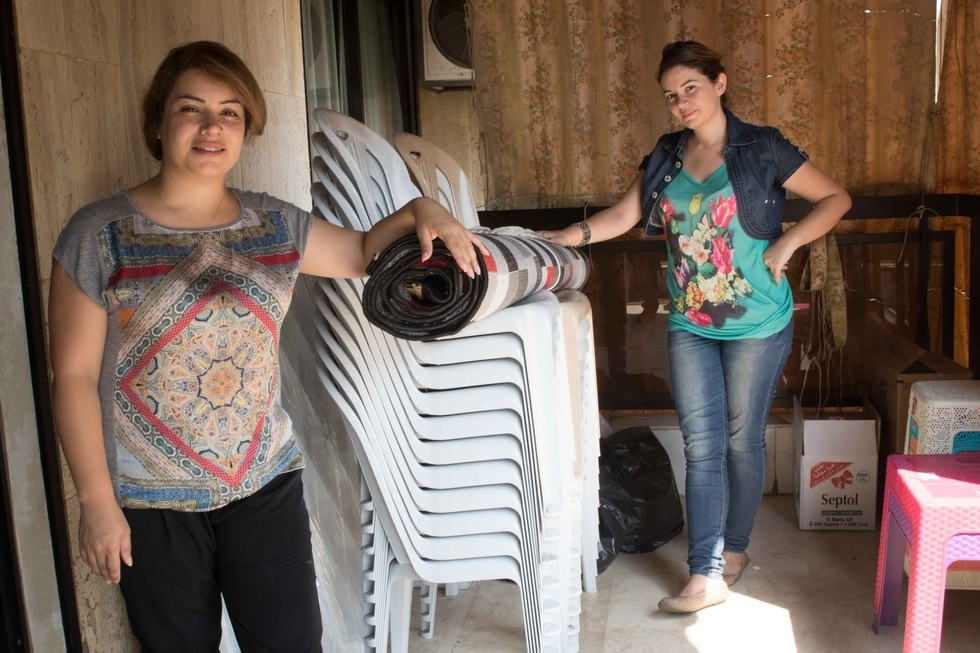
BEIRUT - When Maya Yamout found herself deep within the confines of Lebanon’s Roumieh prison making small talk with an al-Qaeda veteran, she could hardly believe it.
Nor could the prison guards, who were watching her curiously from their positions around the yard. In a place routinely described as "notorious" by the world’s press, the presence of civilians, let alone female students, was unusual.
But remembering all the research that she and her sister Nancy had done in anticipation of this moment, Maya remained calm.
“He asked me what I was doing here, so I explained I was researching those accused of terrorism,” she now recalls of Taha, an athletically built Syrian whose arms bore scars from his time fighting US forces in Afghanistan.
“I explained that I wasn’t interested in security matters, but that I wanted to know about his life and that it would take about an hour.”
The following morning, when she returned, the two of them talked for four hours. This was the first of many conversations she would have within the prison’s thick, barbed-wire topped walls.
Inside Block B
The Yamout sisters are social workers operating in a world usually reserved for prison guards, the army and Lebanon’s Internal Security Force (ISF). They have since become regulars in Roumieh, and more specifically Block B.
It is Block B that gives the prison its fearsome reputation because it houses around 680 men accused of being Islamist militants. It is here that the women have come to seek an understanding of the mindset of those who join al-Qaeda, and, more recently, the Islamic State (IS) group.
In a world where attempts to gain information are often the result of harsh interrogation, the Yamouts tread a different path. They prefer to carefully and slowly delve into the lives of those in Block B to determine what drives people to become militants.
Until now, in Lebanon at least, the security service’s efforts to thwart these networks have had mixed results. The country’s complex sectarian make-up, porous borders and deprivation levels - exacerbated by the influx of roughly 1.5 million Syrian refugees - make it fertile ground for recruitment. Although many plots have been foiled, some have not, including the series of suicide bombings in the northern town of al-Qaa in June which killed five people.
Meanwhile, concerns in Europe and beyond are growing as to where the next attacks might take place. This is why, say the Yamout sisters, the need to engage with Roumieh’s inmates in a new way is more urgent than ever.
“It’s seen that there’s this bogeyman,” Maya explained, “but there are no bogeyman, just men, and we have the techniques to speak with these men.”
Personal beginnings
Nancy and Maya were drawn into Roumieh together having both lost friends in Lebanon to Islamist militant groups.
“I had known him for 10 years and he was studying engineering,” explained Maya of her friend, who died fighting in Syria. “I spoke to his mother to find out what had happened and there was nothing - no economic problems, no divorce, no obvious cause.”
“These experiences made us question a lot,” interjects Nancy, “We wanted to know what happened, and why it is they joined.” The sisters have a jokey and informal demeanour which belies their steely single-mindedness; they needed all of it to get within the prison gates.
First they had to persuade the head of their university that Roumieh was the right place for their masters research; then they had to convince the head of the ISF that they should be given access.
But gaining entry into the prison was the easy part. Hair covered by hijab and nail polish removed, they then began the laborious process of getting the residents of Block B to open up to them.
Given short shrift by some of the guards because of their gender, they were initially given false information by inmates suspicious that the women were spying for the ISF. But slowly they started to gain the men's trust. And as these relationships built, so did insights into how IS and similar groups lure recruits - whether it is by drawing in ideologues, the easily led or simply the sadistic.
Dr Raymond Hamden, a clinical forensic psychologist who has mentored the pair, told MEE that “rather than approach people with an attitude of condemnation, which has been a downfall of many interrogation techniques, they approach things from a humanistic model, whether or not they agree with the activity”.
Acknowledging the complex set of causes behind the growth of groups such as IS, the women claim that a fractured relationship with family and parental figures is the most crucial and common cause.
“At the ages of 15-19 people are creating their own ideology and philosophy in life, and they’re often taking it from their father and mother,” says Nancy. “If they’re not taking it correctly, someone can easily step in to convince them.”
“If a child is raised to be beaten up, the army can beat them from today till tomorrow and they won’t say anything because they’re used to it,” she adds, emphasising the importance of their approach - one which they say is otherwise lacking in Lebanon.
Their observations are distilled in a thesis that has been seen by the government but, they claim, had been carefully written so as not to betray the trust of their subjects. It is work that deserves an international stage, says the Canadian ambassador to Lebanon, Michelle Cameron, who tracked down the sisters after hearing of their efforts. Describing them as “very professional and completely dedicated,” she added that the pair were “filling a niche” in how they were approaching the topic of radicalisation and de-radicalisation.
And now their work is ranging far beyond academic research. They know only too well that a broader challenge lies beyond the prison gates.
Calm amid chaos
As he delicately pieces together the tiny tiles of a mosaic, Karim* is able to find some calm amid the chaos of a life spent on the margins of Lebanese society. “I love making the mosaics, you need to be very careful and it is a piece of art,” he explains.
Karim, 19, was raised in a turbulent home in one of the most deprived parts of west Beirut, and leapt at the chance to attend the workshops, therapy and job training sessions organised by Rescue Me, an NGO set up by the Yamout sisters.
With it, the sisters are working to support newly released inmates, helping them to integrate back into society and are also using the knowledge gleaned from Block B to give hope to those in communities they consider vulnerable to militant Islamist recruiters.
Karim's neighbourhood, where dirt paths weave through crumbling buildings and families live under tarpaulin, is one of them.
Many here lack government IDs, and deprived of rights as a result, they are particularly susceptible to recruitment. Karim confirms that some people have been "brainwashed" here. “At home there is nothing - no authorities, no respect, only chaos,” he says. “I am treated as a human being [in the workshops]. I feel respected.”
Work-life balance
But finding funding to increase the efforts and effectiveness of Rescue Me remains a struggle. Maya scoffs at some potential donors who, put off by their rehabilitation programme within the prison, accuse the sisters of “supporting terrorism”.
“They will leave the prison someday,” both Yamouts vent in unison, “they’re going to be outside!”
To deal with the problem of radicalisation effectively, they say the Lebanese state needs to fund the creation of a behavioural sciences unit to help tackle the militants - an approach already taken by the UK government, among others; for as strong willed as they both are, Nancy and Maya can only do so much.
Back at home where they live with their mother, the blurring of their working and personal lives is plain to see. In their shared bedroom amid the posters and pictures, a map adorns the wall, with red circles urgently scrawled around locations in Europe and America highlighting potential targets for IS attack. The place doubles as the Rescue Me office with chairs stacked on the balcony waiting to be distributed within Roumieh. And they carry memories of some of the more painful interviews with them still.
Yet considering the conversations they have had - the nature of some of the sadistic minds they have scoured - both appear remarkably well adjusted. They knew what they were setting themselves up for and with their keen psychological foresight they arranged sessions with their own psychiatrist before setting foot into the prison. And they do manage to escape work occasionally: Nancy dances Argentine Tango, while Maya indulges a passion for sushi.
But the most vital support is not found in the shrink's armchair, nor in extra-curricular indulgences. “You have no idea how important it is,” Nancy tells MEE of her sister's support, “how much sometimes we pull each other up.”
* Some names have been changed to protect the interviewees' identities.
This article is available in French on Middle East Eye French edition.
Middle East Eye propose une couverture et une analyse indépendantes et incomparables du Moyen-Orient, de l’Afrique du Nord et d’autres régions du monde. Pour en savoir plus sur la reprise de ce contenu et les frais qui s’appliquent, veuillez remplir ce formulaire [en anglais]. Pour en savoir plus sur MEE, cliquez ici [en anglais].


